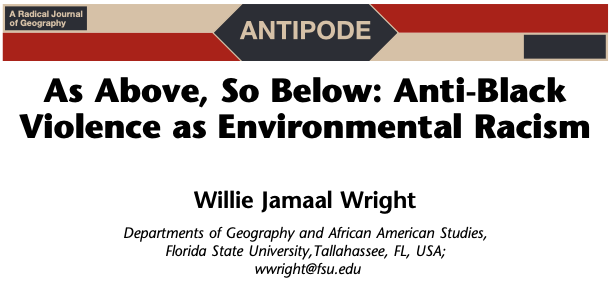 The academic journal Antipode recently announced their top 10 most-viewed articles of 2022. Coming in with 6 times the readership of the average Antipode article is Dr Wright’s 2021 publication As Above, So Below: Anti-Black Violence as Environmental Racism.
The academic journal Antipode recently announced their top 10 most-viewed articles of 2022. Coming in with 6 times the readership of the average Antipode article is Dr Wright’s 2021 publication As Above, So Below: Anti-Black Violence as Environmental Racism.
Among last year’s top ten, Dr. Wright’s article is the fourth most recent to be published. This is a testament to the quick impact of the publication.
Antipode publishes innovative papers that push at the boundaries of radical geographical thinking.
ABSTRACT: Activists and scholars often describe environmental racism as an immoral and illegal dumping of toxic waste into poor, Black, and people of colour communities. Yet, the use of environmental habitats in (and with) which Black people are mutilated, concealed, and contained has gone under-conceptualised as a mode of environmental racism. I propose an expansion of familiar understandings of environmental racism to include the use of environmental habitats to commit and conceal acts of anti-Black violence. This proposition draws from an understanding that environmental racism includes the mutual devaluation of Black bodies and the spaces in which they inhabit. I ground this study in Afro-Pessimist and Black geographies thought, research on environmental racism and cultural analyses of Black literary and performance art. Finally, I draw from the spatial and racial analyses imprinted within James Baldwin’s immense catalogue to put forth Blackness as an alternate human ethic imbued with political possibilities, an ontological conceptualisation which may push activists and scholars to seek redress beyond the policy rationales and recommendations commonplace among today’s struggles for environmental justice.